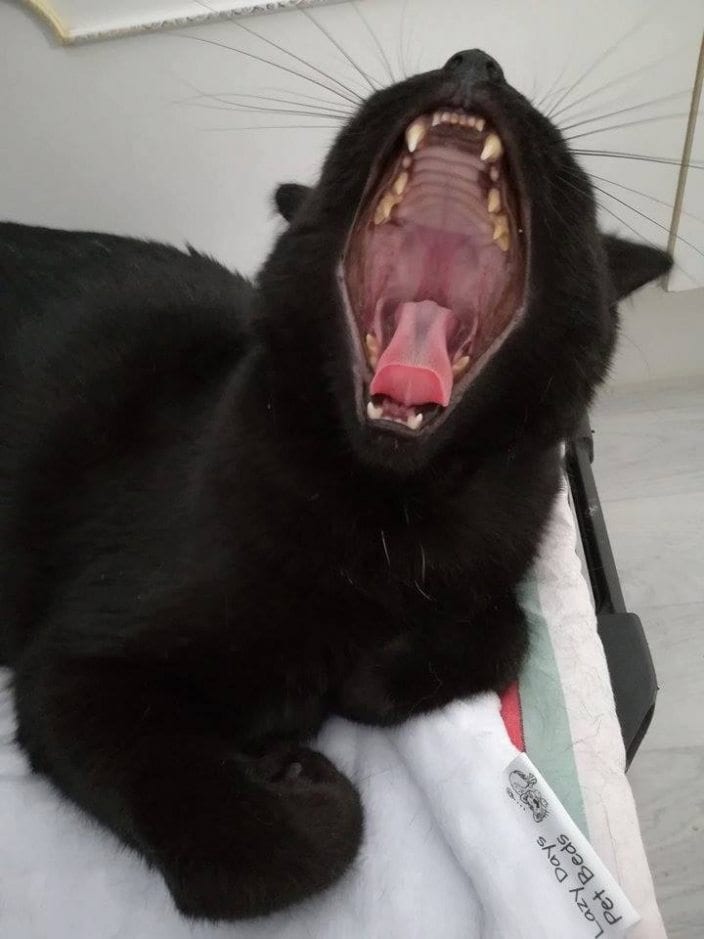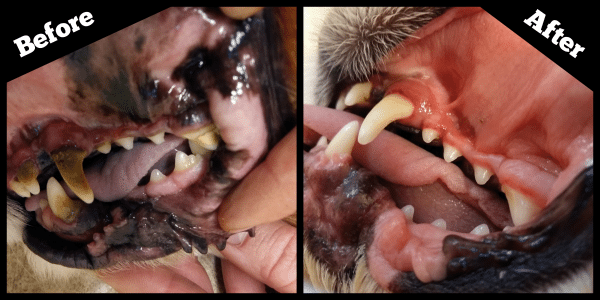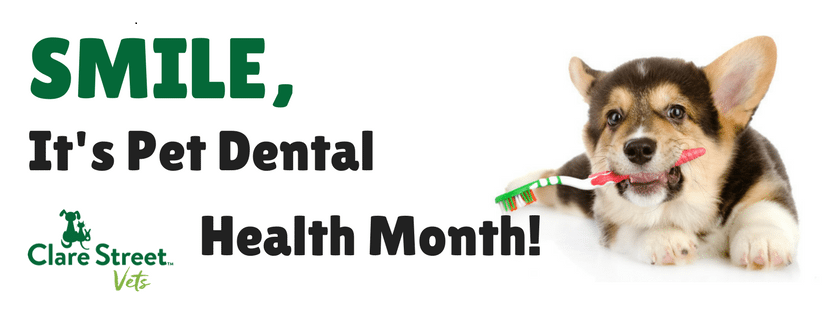By Dr. Kathy Enright
Would you be surprised to learn that one of the most frequently diagnosed health problems in our pets are Dental Health Problems?
That by the tender age of 3, 80% of dogs and cats show signs or periodontal disease? That’s 4 out of every 5 pets!
Like people, pets develop a film of bacteria on their teeth which can harden over time if it is not cleared away. Plaque & Tartar accumulate and infections in the mouth can develop and lead to gum problems – Dental disease.
And it doesn’t stop there, bacteria can enter the bloodstream through these damaged areas and pass to other vulnerable areas such as the valves of the heart, causing secondary problems there.
That’s why it is so important to keep our pets’ mouth healthy.
So what are the signs of dental disease? what do we need to be watching for?
Painful Teeth: Our pets are predator or prey animals and hence they do not show signs of pain, as this would be a sign of weakness. So by the time they stop eating or you hear them crying with discomfort, their oral problems have become quite serious.
Bad breath: Believe it or not, your pet’s breath should not be ‘Bad’, and if it is there is probably an underlying issue!
Swollen & red gums: These are a sure sign of dental disease. Your pet’s gums should be pale pink & moist. There should be no red inflamed areas at the tooth/gum junction.
Visible crusts of tartar on the teeth: This can be particularly obvious in dogs on their canine teeth
Dropping food, or chewing on one side of their mouth: A sure sign of dental pain, when they stop chewing on the sore side of their mouth
Losing weight: Chewing & saliva play a vital role in the digestive process. If this step is skipped due to pain, animals can find it difficult to extract the important nutrients from their food, and they lose weight
Drooling: This is a sign of oral discomfort
Cats will often hide or even vomit up whole pieces of unchewed kibble, if it too painful to chew.
It is also important to note that certain breed are predisposed to dental disease and we need to be particularly mindful of this.
Breeds like Pugs & Chihuahuas etc. regularly suffer with overcrowding of their teeth. This creates more spaces for bacteria to thrive and hence worse periodontal disease. If your pet has an under- or over-shot jaw for example, their teeth are exposed to abnormal forces which can cause fracturing or abnormal wear patterns on their teeth. In finely-bred dogs, we can often see teeth developing in abnormal positions or rotating, and again this can cause major problems. Stone & bone ‘chewers’ can develop root exposures and fractures which are very painful. As they age they can literally ‘wear away’ their teeth to stumps. Retention of baby teeth can greatly affect the adult teeth coming up behind them, they also contribute to overcrowding and abnormal wear and forces on the opposing teeth and should be removed if not falling out by themselves.
Certain breeds of cats such as Siamese, Himalayans & Persians also suffer more with dental health problems.

Say Aaaahhhhh!!!!!!
Rabbits too, if fed inappropriate diets without enough grass or hay in them. Rabbits & some rodents have ‘growing’ teeth and if not worn down with appropriate chewing can develop very bad malocclusion problems and sharp ‘spikes’ which can lead to mouth ulcers and even anorexia. And as we all know, a rabbit who stops eating, should not be taken lightly as it can quickly turn into a veterinary emergency.
Pets who have 100% wet food diets are particularly vulnerable. Dry pet foods with appropriate sized kibbles force pets to chew and crack off some of the plaque on their teeth. They also force our pets to produce more saliva which is extremely beneficial for digestive purposes and in cleansing the teeth.
So how can the vet, vet nurse & the pet owner work together to prevent dental disease?
Firstly, we should be brushing their teeth daily, as we do our own. At Clare Street Vets and Shannon Vets we are happy to advise on how best to initiate this with your pet.
A pet-friendly toothbrush or finger brush, a pet friendly toothpaste (not human toothpaste) and a lot of patience and perseverance are required. Initially they may not like it, but they will get used to it, and like anything the younger we start the more accepting of it they will be.
So what role does your vet and vet nurse play?
Even with daily brushing, an appropriate diet, dental chews, diets etc, your pet will still need regular dental health checks. Annually in their youth but 6 monthly as they move into their senior years. I am glad to say all dental health checks at Clare Street & Shannon vets are free of charge. Our dedicated nurse and vet teams are happy to have a look and advise you on how to prevent problems arising and on how to deal with problems you may already have.
When it comes to dental health, prevention is far better and cheaper than the cure. We advise annual dental health checks and a dental descale and polish if required. Sometimes if teeth are damaged severely with root involvement, removal called ‘extractions’ might be required. Vets are even offering ‘root canals’ now to save the tooth but have a pain free pet. There are a lot more options available now.
So what happens at a dental descale and polish?
Your pet will have to undergo a general anesthetic. They wouldn’t lie still and be able to keep their mouth open otherwise. This is generally a 1-day procedure with your animal being returned to you on the same day. As when you go to the dentist an ultrasonic descaler is used to clean not only the surface of the teeth but also under the gums too. And it is this under-the-gum clean that is vital to our pet’s dental health.

As February is Pet Dental health month, we at Shannon & Clare Street Vets are offering a free pet goody bag after every dental performed during the month. As said earlier we always offer free dental health checks and advise on dental care so don’t hesitate to give us a call and book your free Dental check up at Shannon Vets 061 472161, Clare Street Vets 061415104 or online www.rockhallveterinary.ie
Finally for a list of food and treats that are good for your pets dental health, check out the ‘Veterinary Oral Health Council’ http://www.vohc.org/accepted_products.htm

